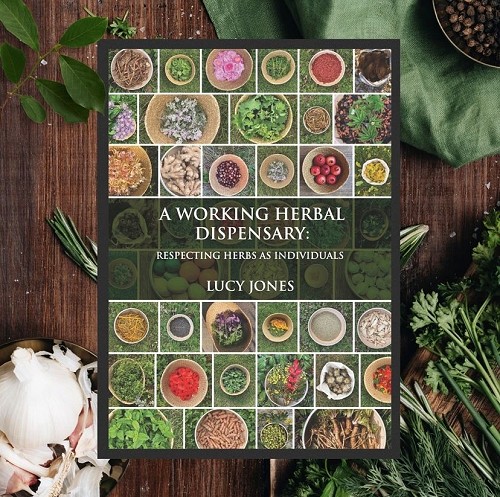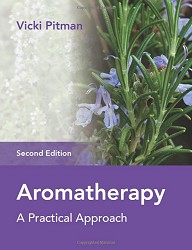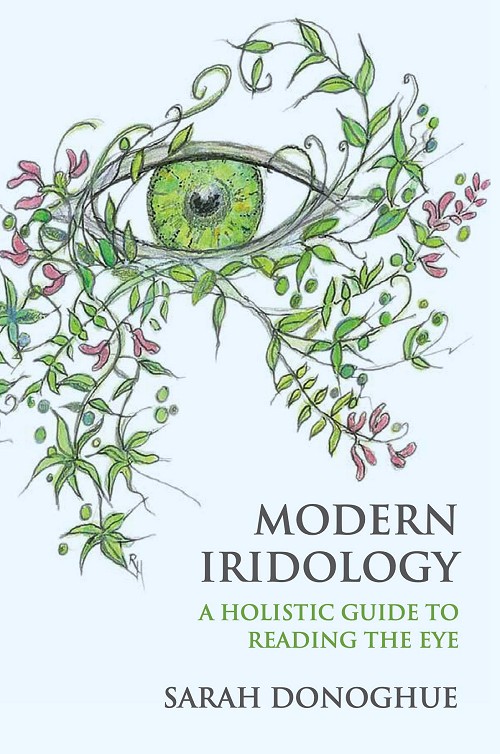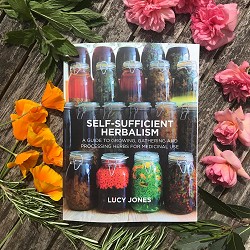Book Reviews
A Working Herbal Dispensary: Respecting Herbs as Individuals by Lucy Jones
 A beautifully illustrated guide on how to understand and engage with medicinal herbs.
A beautifully illustrated guide on how to understand and engage with medicinal herbs.
In her fascinating second book, full time medical herbalist Lucy Jones shares the characters and medicinal virtues of 108 herbs that she works with in her practice. Each herb is written as an individual that she knows and respects, rather than simply a list of conditions it treats or the constituents it contains.
Guided by Lucy's engaging and thoughtful prose, readers will journey through the physiological actions, energetic qualities, and emotional resonances of individual herbs, as well as qualities according to Tibetan Medicine, where they apply. Also included are historical views, magical associations, recipes for the home apothecary and many informal case studies to illustrate the virtues of the herbs.
Beautifully illustrated with colour photographs throughout, A Working Herbal Dispensary is more than your run of the mill herbal; it is an insight into a holistic practice where herbs and herbalist are working in partnership for the benefit of those that need help.
"The book is a rare gem, as it is not just re-writing every other herb book but comes from the heart of a busy practitioner who uses herbs clinically every day. Lucy doesn't just 'use' the herbs to 'fix what's broken', rather she understands how they holistically heal the whole person. These monographs are not just short paragraphs of what conditions the plants are 'good for', but a top-notch interweaving of tradition and experience that capture the medicinal essence of the plants. 'The binding of this book is going to become well-worn over the years."
Sajah Popham, founder of 'The School of Evolutionary Herbalism'
"Another wonderful herbal from Lucy, rich in ancient lore and insights from the Tibetan tradition brilliantly interwoven with wisdom, experience, and practical tips from a working herbalist and a self-sufficient one too! With fascinating and detailed descriptions of over one hundred herbs, enlivened by photos of herbs lovingly grown and foraged by Lucy, this book is testimony to the living tradition of herbalism in England and a great opportunity to learn how a clinical herbalist implements the tools of their trade. Thank you, Lucy!"
Anne McIntyre, medical herbalist (FNIMH) and author of 'The Complete Herbal Tutor' and 'Healing with Flowers'
"This work will undoubtedly go on to become canon in the arena of herbal medicine. It does not just provide information, with Lucy's deep understanding and long clinical practice, it's also experiential. A Working Herbal Dispensary takes us on a journey into the plant kingdom; a journey where we experience and really connect with the energies, and magic, we encounter when we work with healing plants."
Karen Stone, founder of the Arura Healing Centre and practitioner of Traditional Tibetan Medicine
A Working Herbal Dispensary is published by Aeon Books, and will be available from the end of May 2023.
Vicki Pitman's Aromatherapy book is now published!

Aromatherapy - A Practical Approach (Second Edition) - Vicki Pitman
From the back cover: "This comprehensive guide to aromatherapy provides thorough coverage for students and is also an excellent reference for practitioners. It includes all the information required by students training on aromatherapy courses accredited to Levels 3 or 4."
If you'd like a copy, click here to buy from Amazon (or you can order one from an independent bookshop).
Modern Iridology: A Holistic Guide to Reading the Eye by Sarah Donoghue
 A practical, accessible and insightful handbook on reading the eye.
A practical, accessible and insightful handbook on reading the eye.
The human eye is a blueprint of the bodies genetically inherited strengths and weaknesses: a comprehensive health profile that allows one to make informed dietary and lifestyle choices that fully support one's unique constitution.
This book is a guide to the often-misunderstood subject; a practical manual that can be easily used by holistic practitioners, medical professionals and interested enthusiasts alike. Complete with high quality photographs, charts and detailed case studies, this essential book should be a staple on every modern herbalists' bookshelf.
Taking a holistic approach, author Sarah Donoghue explores the subject of iridology from a scientific, physical and emotional perspective. It allows readers to safely examine the iris and make confident assessments, as well as formulate individualised herbal, dietary and lifestyle interventions based on information gleaned from the depths of the endlessly fascinating iris!
Sarah Donoghue is an herbalist and naturopath with over thirteen years’ experience working with botanical medicines. She completed her training at the College of Naturopathic Medicine in London in 2007 where she studied western herbalism, Ayurveda, traditional Chinese herbal medicine, and Iridology.
Sarah now runs a busy practice on the Cornish coast in the South West of England, where she manufactures her own range of herbal tinctures and skincare products. Sarah is passionate about herbal education and writes widely on the topic of self sufficient herbalism and historical remedies. She has published many articles both online and in print.
Sarah is also proud to be an Ambassador for the Herb Society.
You can find out more about Sarah and her work at https://alchemilla.co/ or by reading her fascinating newsletter https://theherbalistsdiary.substack.com/
Lucy Jones has had her book published: 'Self Sufficient Herbalism'
 Self Sufficient Herbalism is the first ever practical guide to the growing, gathering, and preserving of medicinal herbs for a working dispensary. Written by a practising herbalist with a high street clinic, it covers everything you need to know to become truly self sufficient in creating and dispensing your own herbal medicine.
Self Sufficient Herbalism is the first ever practical guide to the growing, gathering, and preserving of medicinal herbs for a working dispensary. Written by a practising herbalist with a high street clinic, it covers everything you need to know to become truly self sufficient in creating and dispensing your own herbal medicine.
Relying on only a small allotment and access to the fields and woodlands of rural England, Lucy Jones provides a masterclass in the wild crafting, growing, harvesting, drying, storage, and processing of medicinal herbs. Her passion for the plants and traditional ways of preserving them for medicine shines through as she explores the deeper implications of self-sufficiency and the transformative impact it has had on her practice.
The guide includes a glossary of detailed notes on the cultivation, harvesting, and processing of 108 individual herbs arranged by the seasons. It is a must read for practising herbalists, herbal students, herb gardeners, and all those who love herbs.
100 HERBS OF POWER
Classical Herbalist John E. Smith’s New Book Discusses the Power and Tradition of Herbs
100 Herbs of Power is an influential read detailing the traditional and medicinal uses of herbs for healing in a world where natural solutions are often overlooked.
Author John E. Smith sees a world that has a lot of potential for harmony and beauty, and yet also a lot of discord and things that make little sense in terms of universal betterment.
"If I can make the tiniest difference, that’s great,” Smith said.
And the difference that Smith has made is the writing of his new book 100 Herbs of Power. In this potent work, he describes the rich, colorful history and traditional uses of medicinal herbs from numerous cultures around the globe. He outlines the potential of these powerful herbs in a world where science often overshadows common sense.
This influential book is a must read!
Publisher’s website: http://www.strategicbookpublishing.com/100HerbsofPower.html
About the Author:
John E. Smith, B.A. (Hons) M: URHP. Dip C.H. is a classical herbalist who has worked and studied throughout Europe, the United States, China, India, Australia, the South Pacific and the Middle East. His interest in traditional systems of healing has inspired this multi-cultural approach to herbal medicine.
For media inquiries, appearances, or other publicity — please contact:
Ellen Green — PressManager@aegpublishinggroup.com
AEG Publishing Group, Inc.
845 Third Avenue, 6th floor-6016 – New York, NY 10022
http://www.Strategicbookpublishing.com - http://www.EloquentBooks.com - http://www.StrategicBookMarketing.com
1-888-808-6190 - Corporate Office

